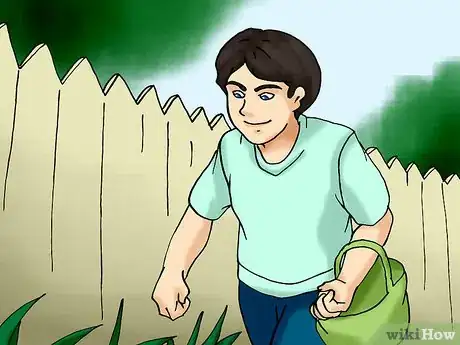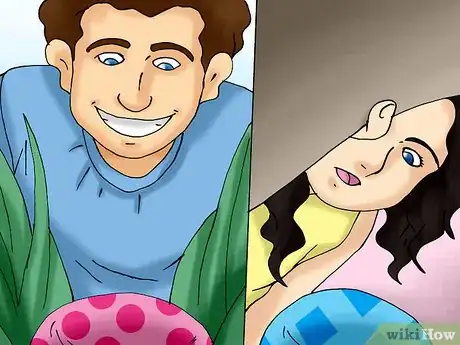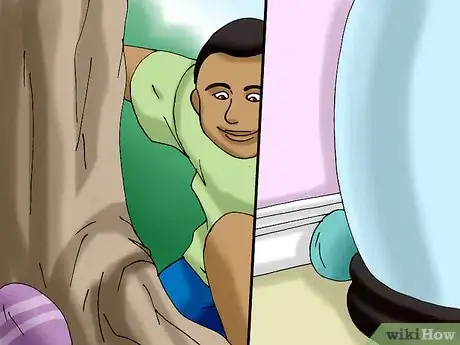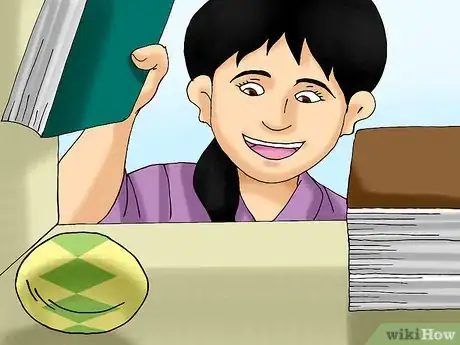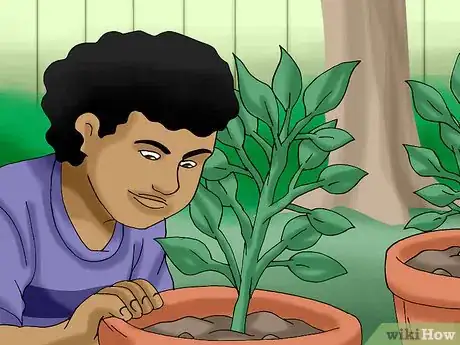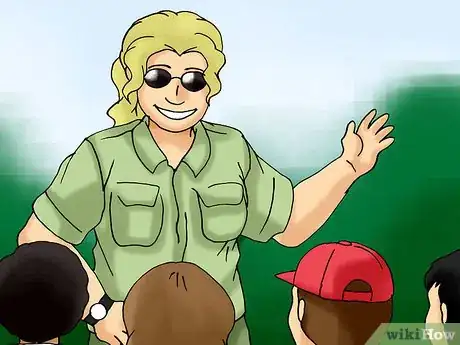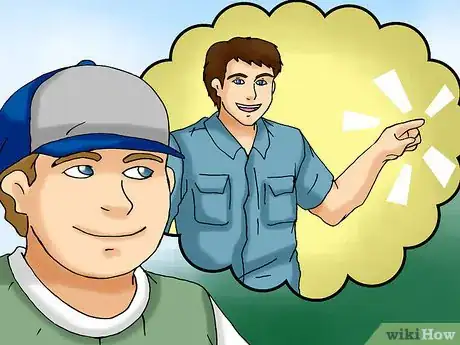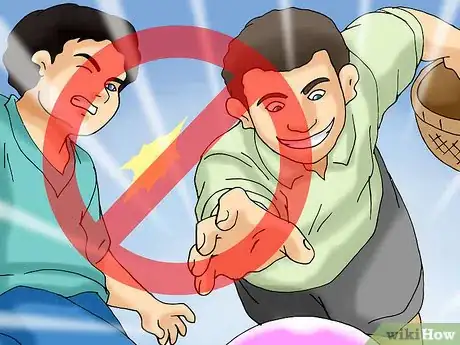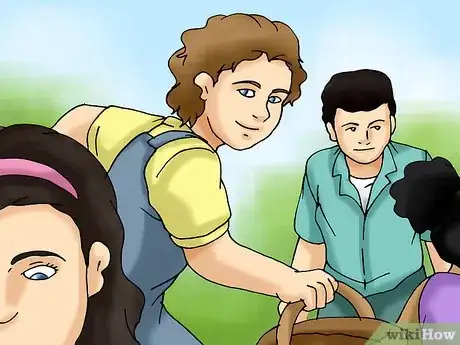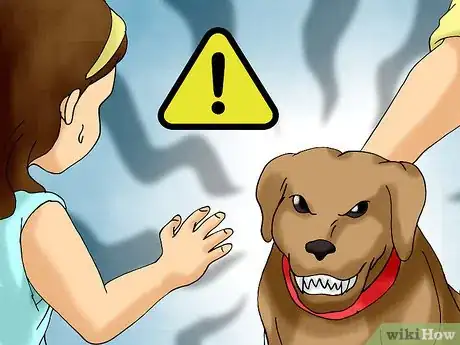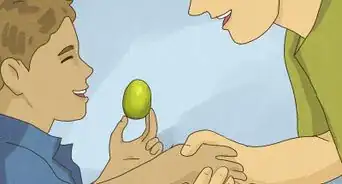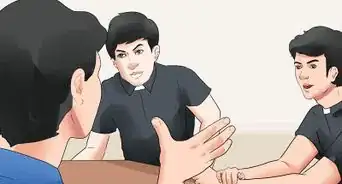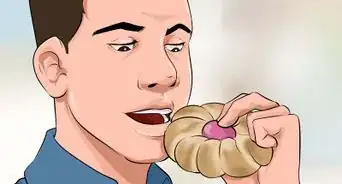This article was co-authored by wikiHow Staff. Our trained team of editors and researchers validate articles for accuracy and comprehensiveness. wikiHow's Content Management Team carefully monitors the work from our editorial staff to ensure that each article is backed by trusted research and meets our high quality standards.
There are 8 references cited in this article, which can be found at the bottom of the page.
wikiHow marks an article as reader-approved once it receives enough positive feedback. In this case, several readers have written to tell us that this article was helpful to them, earning it our reader-approved status.
This article has been viewed 43,733 times.
Learn more...
If you're off to go on an Easter egg hunt, you want to find as many eggs as you can! Start by staying in the right area, which your hosts will tell you about. Then, look for eggs high and low, but make sure you're staying safe and playing by the rules as you do!
Steps
Hunting down the Eggs
-
1Plan how you want to walk around the area. Instead of just running back and forth, search in a pattern. That way, you won't waste time going over areas you've already checked.
- For instance, try going around the edge of the area once, then walk around the middle.
-
2Check the ground first. Sometimes, eggs will just be laying in the grass. Look for the bright colors to find eggs. The eggs should be easy to see unless the grass is tall.[1]
- If the grass is tall, walk around the area, looking down into the grass to spot the bright eggs.
- Inside, the eggs might be in the carpet.
Advertisement -
3Look behind things like trees and furniture. If you see a tree, a shed, or play equipment, make sure to look all around it. Go behind it to see if anything is hidden there. That's a good hiding place for eggs![2]
- Inside, you might find eggs behind furniture or potted plants.
-
4Hunt under bushes, furniture, and play equipment. Lots of times, your eggs will be underneath things, so get down low and look around. Crawl around under the bushes, or duck under a picnic table.[3]
- Once you're down low, look around at that level to see if there are any others nearby.
- When you're indoors, look under tables and furniture!
-
5Check high places, too, like trees, bushes, and tables. Egg hiders can be tricky, and they may hide eggs in trees, on top of bushes, or on top of fences. Don't just look at the ground. Look up and around, too.[4]
- Indoors, check bookcases, shelves, and tabletops for eggs.
-
6Look inside things for eggs. Things like flower pots, unused grills, and under cushions are great places to hide eggs. Check inside anything you see, and look under cushions to see if there are any eggs there.
- Inside the house, look inside vases, potted plants, and candle holders, for instance.
-
7Listen for clues when there are only a few eggs left. Near the end, the egg hiders might start giving out clues to hard-to-find eggs. Be sure to pay attention if you hear an adult trying to get everyone's attention.
Playing by the Rules
-
1Stay inside the lines! When the hosts tell you where you can hunt, listen closely! Watch where they point. That's where all the eggs will be.[5]
- If your hosts divided you by age group, don't go into areas for other age groups![6]
- Even if you forget what your hosts said, there may be signs up to tell you where the boundaries are! If you can find those signs, use those to show you where you can hunt.
-
2Listen to the rules. The rules will be different in each place you do an egg hunt. For instance, maybe you can only collect a certain color egg if you're a certain age. Other times, you can only start hunting when someone blows a whistle. Listen to know how to hunt eggs without getting in trouble.[7]
- Plus, there may be special eggs that you collect for extra prizes!
-
3Let the younger kids get some eggs. Don't snatch up an egg right from underneath a toddler. Let them have that egg. They won't be able to find as many eggs as you!
- Try not to knock down anyone in your hurry to get an egg.
-
4Stay safe by looking where you're going. Easter egg hunting is fun and exciting, and of course you want to get as many as you can! But, you don't want to get hurt. Make sure you're watching where you're going so you don't run into anything or trip over something.[8]
-
5Keep away from animals you don't know. If you see a dog or cat, you, of course, want to pet it. But if it's on it's own, you should stay away. It might bite or scratch you because it doesn't know you well.[9]
- If the owner is with the animal, ask if you can pet it.
- Stay away from other animals, too, such as bunnies, squirrels, and mice, if you see any, unless they're in a petting zoo.
Community Q&A
-
QuestionWhere would you find them if they're hidden in the kitchen?
 JLuckenbillCommunity AnswerLook inside pots or any other containers that are out on the counter! Check under the table and other furniture, and in the cabinets and the refrigerator.
JLuckenbillCommunity AnswerLook inside pots or any other containers that are out on the counter! Check under the table and other furniture, and in the cabinets and the refrigerator. -
QuestionWhere should I look for Easter eggs in a bathroom?
 Community AnswerTry looking where the towels are kept and in cabinets, under the sink, etc.
Community AnswerTry looking where the towels are kept and in cabinets, under the sink, etc. -
QuestionWhat are common places to hide eggs?
 Community AnswerIf you are outside, bushes, shrubs, and trees make great hiding places. If you are inside, cabinets, behind pillows, and in small house plants are great hiding places.
Community AnswerIf you are outside, bushes, shrubs, and trees make great hiding places. If you are inside, cabinets, behind pillows, and in small house plants are great hiding places.
References
- ↑ https://rochester.kidsoutandabout.com/content/easter-egg-hunts-tips-and-tricks-great-party
- ↑ https://rochester.kidsoutandabout.com/content/easter-egg-hunts-tips-and-tricks-great-party
- ↑ https://www.lakeside.com/browse/Kid-Safety-Tips-for-Outdoor-Easter-Egg-Hunts/_/N-1z0te15Z1z0xzct
- ↑ https://www.lakeside.com/browse/Kid-Safety-Tips-for-Outdoor-Easter-Egg-Hunts/_/N-1z0te15Z1z0xzct
- ↑ https://www.epicurious.com/holidays-events/how-to-host-an-easter-egg-hunt-article
- ↑ https://rochester.kidsoutandabout.com/content/easter-egg-hunts-tips-and-tricks-great-party
- ↑ https://www.kidspot.com.au/things-to-do/seasonal/easter-galleries/10-tips-for-a-fun-easter-egg-hunt/image-gallery/8b13baaa660d456820aed94753426734?image=3
- ↑ https://www.lakeside.com/browse/Kid-Safety-Tips-for-Outdoor-Easter-Egg-Hunts/_/N-1z0te15Z1z0xzct
- ↑ https://www.lakeside.com/browse/Kid-Safety-Tips-for-Outdoor-Easter-Egg-Hunts/_/N-1z0te15Z1z0xzct
About This Article
If you’re going on an Easter egg hunt, you’ll find more eggs if you work in a pattern. For instance, you could try walking all around the outside of the area, then around the middle. Although some eggs will be sitting right on the ground, you should also look for hiding spots that aren’t obvious at first. You might find eggs hidden beneath a tree, tucked into a flower bush, or inside a potted plant. Don’t forget to check up high, like on top of a fence or in a tree branch! For tips on playing by the rules, like letting younger kids find some eggs, read on!
